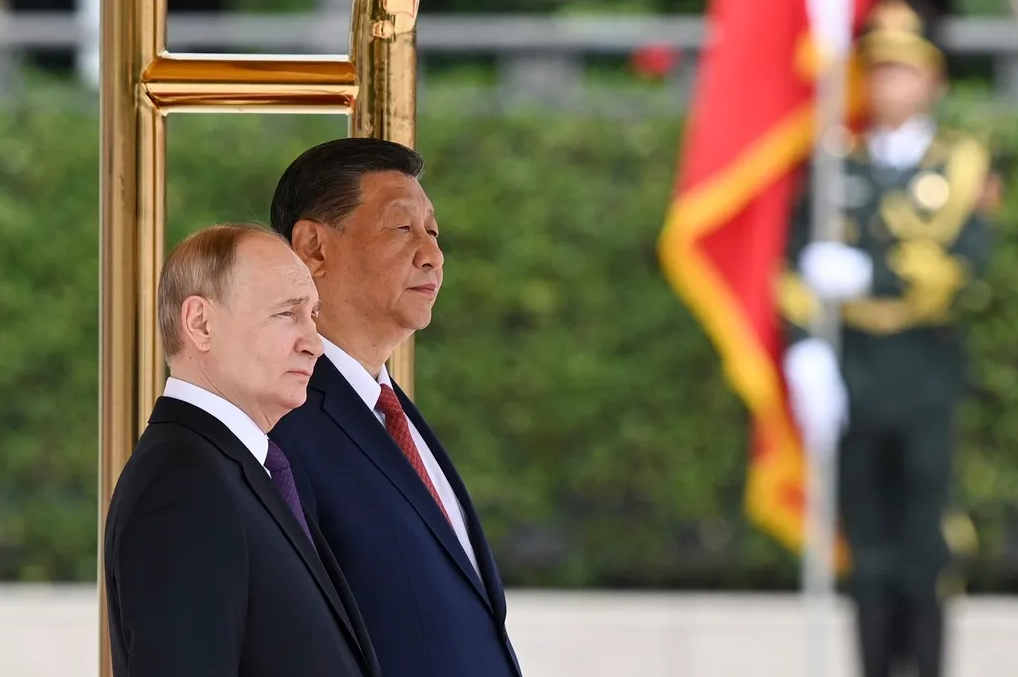
Chinese President Xi Jinping, right, and Russian President Vladimir Putin attend an official welcome ceremony in Beijing, China, on Thursday, May 16, 2024. (Sergei Bobylev, Sputnik, Kremlin Pool Photo via AP)
Russian President Vladimir Putin will travel to China in mid-May, his first official trip abroad since the start of his new presidential term. The choice of destination underscores the importance he attaches to relations with China. The upcoming visit coincides with the 75th anniversary of the establishment of diplomatic relations between China and Russia, with improved bilateral security cooperation as its strategic goal.
As a politician who experienced the Soviet Union’s collapse firsthand, Putin has a keen understanding of his country’s security issues and has taken assertive actions to shore them up. In his State of the Union address in late February, he unveiled the idea of building a new framework of equal and indivisible security across Eurasia, stressing Russia’s readiness to engage in dialogue with all countries to achieve that goal. There can be no lasting world order without a strong Russia, he added.
The proposal is a direct response to the West’s effort to contain Russia. In fact, Russia’s motives for the framework are straightforward. First, the old European security system based on equal and indivisible security no longer exists. NATO and the Organization for Security and Co-operation in Europe are now controlled by the collective West, and the Eurasian region has an asymmetric security landscape, with NATO on one side and Russia on the other. Second, Russia seeks strategic balance to deter the collective West by creating a new security framework.
In Russia’s eyes, the new framework operates on the following principles:
• First, it is a multilateral cooperation mechanism but not necessarily a military alliance similar to NATO.
• Second, it encompasses multiple security domains —military, digital and financial.
• Third, it leverages the potential of existing institutions and organizations, such as the Shanghai Cooperation Organisation and the Collective Security Treaty Organization.
• Fourth, its roles and positioning are focused on addressing potential threats.
Judging from these principles, the new framework appears to be a quasi-alliance and a security cooperation model tailored for China.
Quasi-alliance vs. dual containment
The term dual containment was officially introduced by the United States in its Middle East policy in February 1994. Putin’s dual containment, by contrast, refers to the aggressive containment strategy employed by the collective West against both Russia and China. Although the quasi-alliance can potentially provide a certain strategic deterrent against dual containment, joining it is risky in the context of the Ukrainian war. Different countries are exposed to common threats in different ways, and members of a quasi-alliance have to consider whether the benefits of cooperation outweigh the risks.
In addition, common threats are dynamic and evolve with changes in the international system and national foreign policies. Therefore, it is difficult for a country in a quasi-alliance to predict the extent of risk posed by its partners’ behavior. When faced with such risks, states also need to consider whether their partners will give them up or provide selfless support.
A review of Russia’s international behavior reveals different policies toward its allies. It took proactive intervention to quell the 2022 riots in Kazakhstan, because doing so could bolster Russia’s position in the post-Soviet region without incurring significant costs. However, in the case of the Nagorno-Karabakh conflict after December 2022, Russia, which was at war with Ukraine, refrained from extending a helping hand to its ally Armenia, resulting in a major breakdown in their relationship. Consequently, as the war in Ukraine drags on, Russia’s efforts to form a quasi-alliance may produce the following result: While other countries may share Russia’s risks, Russia may be unable to reciprocate by sharing their risks.
“Five always”
As the international system fails to curb hegemonism, unilateralism and Cold War mentality, strengthening China-Russia strategic coordination can play an irreplaceable role. However, such coordination is not without conditions. In fostering its relations with Russia, China has been adjusting its foreign policy to adapt to the evolving international order. To consolidate and develop relations, China emphasizes the importance of the “five always” principles. The two countries should:
• always follow the strategic guidance of head-of-state diplomacy;
• always adhere to the principle of no-alliance, no-confrontation and no-targeting of any third party;
• always stay on the right course on major matters of principle;
• always pursue win-win results through cooperation; and
• always advocate an equal and orderly multipolar world.
These principles signify China’s readiness to conduct strategic consultations on Russia’s new Eurasian security framework, but on the premise that it should adhere to the principles above. As a matter of fact, these principles define China’s fundamental proposition for the development of its relations with Russia. They not only meet the two nation’s aspirations for win-win cooperation but serve the fundamental interests of the Chinese people.
As China strives for modernization on its own terms, courage and wisdom are priorities in its diplomatic strategy. Lessons drawn from history dating to the era of George Kennan’s Long Telegram demonstrate that containment strategies fail to resolve differences between major countries. Instead, they merely show which is stronger. After all, the pursuit of hegemony was the undoing of the Soviet Union. Only by understanding the dynamics of international competition can a nation prevent the major strategic losses that come with escalating rivalry.
